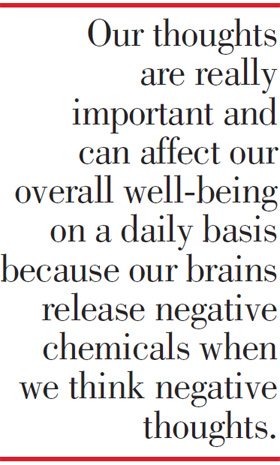
Emotional quotient for your health.
Being emotionally intelligent and striving to keep your brain healthy can make for a better life. Having a high emotional quotient (EQ) can offer significant health benefits, and unlike the standard intelligence quotient (IQ) tests where that number is pretty much set in stone, the EQ quotient can actually rise, letting you enhance your personal and professional life and in turn increase your happiness quotient (HQ).
Smart isn’t just how high you score on an IQ test. It includes a lot more than being able to answer, “What day is it today if the day before the day before yesterday is three days after Saturday?” When someone tells me that a person is smart, I often think, “In what capacity?” Other than being a neurosurgeon or an astronaut, for example, because they automatically get the smart certificate, I’m always a little skeptical. An occupation doesn’t quite tell me if someone’s smart or not because I’ve seen too many people slip through the corporate cracks and get those coveted promotions simply because they have a high EQ. These people usually seem intelligent and capable and are highly sought out in the workplace — even without the specific job skills.Yes, really.
The Carnegie Institute of Technology’s research has shown that 85 per cent of financial success is due to skills in “human engineering,” which is your personality and ability to communicate, negotiate and lead. Only 15 per cent of financial success is due to technical knowledge.
A high IQ is impressive, but you can’t really show it in everyday circumstances. What you can show is social awareness, which is your ability to give thoughtful consideration to someone’s feelings before acting. In other words, think, take a deep breath and don’t say something you’ll regret later.
Emotional intelligence is how you handle yourself in social situations. It includes being able to read people and communicate with them effectively and move them in the direction you desire as well as having social competencies, social graces, boundaries and quick wits.
It’s equally important to have a good understanding of your own emotions, strengths, weaknesses, needs and drives.
Another kind of smarts is “street smarts,” which includes but isn’t limited to intuition and common sense. Being street-smart also means being observant and knowing what’s around you at all times, knowing who the players are and how you can communicate with them to get them on your side.

An interesting EQ quality is self-motivation. This is about being passionate and driven to achieve your goals. Motivation is a big one because someone could have great talent, but if she’s not motivated to develop that talent and doesn’t know what she needs to do in order to succeed, then chances are she won’t be successful despite a high IQ. Consider that people with a high IQ and great capabilities can say something stupid and get fired. For example, I’ve seen a director of global sales get fired simply because he said to the CEO that the expectations for the sales team were too high. Now that wasn’t very smart of him, was it?
In Howard Gardner’s Frames of Mind: The Theory of Multiple Intelligences, Gardner says, “Interpersonal intelligence is the ability to understand other people: what motivates them, how they work, how to work cooperatively with them. Successful salespeople, politicians, teachers, clinicians and religious leaders are all likely to be individuals with high degrees of interpersonal intelligence.”
So how do we raise our EQ to give us a better quality of life? Change your way of thinking about a negative situation so that it doesn’t affect your judgment, and turn it into a more positive approach. Become aware of your inner dialogue. Stress can really lower your EQ, so having good coping techniques to help diffuse a potentially volatile situation is valuable. This probably would have helped that director of global sales.
Your thoughts are really important and can affect your overall well-being on a daily basis because our brains release negative chemicals when we think negative thoughts. When someone’s angry, her heart beats faster and her muscles tense, or she may get a stomach ache. When you have happy thoughts or think of something peaceful, your body will react differently. Your muscles will relax and your heartbeat will slow down.
One of the ways to use positive thoughts to promote physical well-being is to use the Automatic Negative Thoughts therapy developed by neuropsychiatrist Daniel G. Amen. The key is to recognize the negative thought once it enters your mind, write it down, and talk back to it. Once you do, the thought no longer has power over you, and you can look at a situation in a more positive way. It’s like being an observer of your own mind — almost like watching a movie, but you get to control the outcome.
It also helps if you don’t jump to conclusions when you observe someone’s expression or behaviour. It’s better to think that there are other possible explanations or interpretations and not to automatically believe that unwelcome behaviour is directed at you personally. If we widen our perspective, we minimize misunderstandings — and we feel better too. Positive thoughts and a positive attitude will help you radiate a sense of well-being, making it easier for others to connect with you and helping you be more effective in your life.
The ideal is to combine EQ (which means expressing your feelings with a happy mindset while remaining playful, spontaneous and aware that life has meaning) with a strong IQ (which allows you to say things that are interesting and intelligent in a social setting).
Scientists haven’t yet agreed on what exactly human intelligence is, but it seems that if you have the wherewithal to navigate events and lead situations to go your way and you’re happy with how things turn out, then your EQ is working for you.
By the way, the answer to that IQ question earlier is Friday.
BY GAIL TRAVERS
COMMENTS
YOU MAY ALSO LIKE
Newsletter Sign Up
Subscribe to our FREE newsletter for all of the latest news, articles, and videos delivered directly to your inbox each day!


















































































































